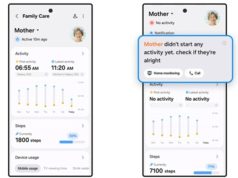Based on its neural-network research, the Microsoft subsidiary releases an updated version of its SwiftKey Keyboard for Android with smarter autocorrect.
SwiftKey, the mobile predictive keyboard specialist that Microsoft acquired earlier this year, has released an update to its eponymous app that promises to deliver smarter suggestions.
While billed as a timesaver, the predictive text and autocorrect functionality built into the on-screen mobile keyboards can often become a source of frustration. Oftentimes failing to deliver the desired or appropriate suggestion, predictive keyboards can quickly turn a rushed text message or hurried email into meme fodder, or worse, spark a workplace misunderstanding.
With its latest update to SwiftKey Keyboard for Android, based on neural-network technology that takes cues on how human brains process information, the company claims it has made a big leap in predictive keyboard accuracy.
“With this update, SwiftKey is now able to meaningfully capture the relationship and similarity between words,” wrote the SwiftKey team in a blog post. “For example, having previously seen the phrase ‘Let’s meet at the airport,’ the technology is able to infer that ‘office’ or ‘hotel’ are similar words which could also be appropriate predictions in place of ‘airport.'”
Previously, SwiftKey employed an “n-gram” model that analyzed the last couple of words in a message and offered suggestions based on words that commonly follow that sequence. In contrast, the new neural network-based system is trained with millions of sentences, enabling it to understand the relationships between words and predict phrases with better accuracy, even ones it never encountered during its training.
For now, the updated system works in U.S. and UK English and is available as an update to the SwiftKey app in the Google Play store. Other languages are in the works, said Microsoft.
The technology hails from the SwiftKey Neural Alpha project the group launched last fall, prior to being acquired by the Redmond, Wash., software giant. SwiftKey initially released the app last fall under its Greenhouse program. Similar to Microsoft Garage, Greenhouse is a collection of Android apps that allows participants to test SwiftKey’s latest innovations.
Other projects include the Hexy Launcher, a home screen app that organizes commonly used apps into hexagonal tiles, and SwiftKey Symbols, which helps special-needs individuals communicate using symbol-based assistive technologies. Marking the 400th anniversary of the Bard of Avon’s death, in April SwiftKey released ShakeSpeak, a keyboard app that adds some Shakespearean flair to users’ writings.
“SwiftKey’s technology learns your personal writing style to predict what you will most likely type next,” said Caroline Gasparin, SwiftKey’s head of Languages, in an April 6 announcement. “We have trawled thousands of words from his plays for SwiftKey to learn from the great playwright himself build this personalized language model.”
In June, SwiftKey added a new feature, simply called Clipboard, that retains the snippets users copy or cut for an hour, in addition to the very last one, enabling them to paste items gathered during that time. Users can keep copied items longer by pinning them or add new items, like emails and other commonly used clippings.







